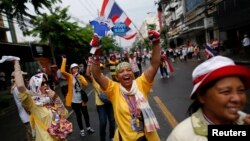BANGKOK —
Thailand's Constitutional Court has ruled the country's caretaker prime minister and some of her Cabinet must step down for abuse of power. This comes after months of political deadlock, and renews concerns of the possibility of violence between supporters and opponents of the government.
The Constitutional Court ruled Yingluck Shinawatra and members of her Cabinet abused their authority when they transferred a national security council official, which paved the way for her relative to become the national police chief.
Presiding judge Charoon Intachan read the final part of the lengthy verdict which removed the prime minister.
The judge says that in accordance with the constitution the premiership is now declared vacant. He adds that all nine surviving members of the Cabinet, when the unlawful personnel transfer was made in 2011, must also step down.
The remaining members of the Cabinet quickly selected from among themselves the interim commerce minister, Niwatthamrong Boonsongpaisan, as the new caretaker prime minister.
Thanking supporters
Shortly after that announcement, Yingluck made a televised speech thanking the people for their trust and support in difficult times.
The outgoing caretaker prime minister says despite the court ruling she did not violate the law.
Her governing Pheu Thai Party calls the Constitutional Court's verdict a conspiracy to try to destroy democracy.
A former foreign minister Nappadon Pattama, who is a supporter of the current government, contends the court's decision is unconstitutional, but says it is likely to be accepted.
"The prime minister has done nothing wrong. But the court ruled against the prime minister. What I am surprised at is the court didn't disqualify the whole Cabinet. This is good," said Nappadon Pattama.
Chulalongkorn University political science professor Thitinan Pongsudhirak agrees that leaving in place 25 members of the Cabinet provides some short-term stability.
"I am cautiously optimistic while I've been pessimistic all along. This time the Constitutional Court did not go all the way. They went almost all the way. They got rid of Yingluck, got rid of the Cabinet [members] from three years ago but they left some Cabinet members behind to succeed Yingluck and to run a caretaker administration. This means we have a chance to get to the election day," he said.
Third PM to be removed by courts
This is the third time Thailand’s courts have removed a prime minister since 2006. All three represented parties backed by Thaksin Shinawatra, Yingluck’s elder brother, who remains the main backer of the Pheu Thai party.
Thailand’s election commission has called for a new nationwide ballot on July 20th. The government has rejected a proposal by an opposition leader to delay the vote six months to put in place political and electoral reforms, leaving the election date in doubt.
The head of the group of protesters who occupied parts of Bangkok for months says an unelected people's council should run the country for an indefinite period to put in place reforms that prevent election rigging.
Government supporters have contended the real reason the Democrats and allied groups oppose elections is because they know the majority of the electorate will not vote for them.
The judicial ouster of the prime minister angers long-time core supporters of the Shinawatra family. Tens of thousands of so-called Red Shirts, popular among the rural population in the northern part of the country, are expected to begin moving towards the capital for a mass rally here Saturday, according to protest organizers.
Fear of more clashes
That could lead to clashes on the streets with the yellow shirts and other anti-government elements.
Former foreign minister Nappadon is hopeful that the red shirts will not provoke any violence.
"We have to prevent any possible clash with our opponents. Otherwise the clash or the violence would be cited as an excuse to stage a military coup or any uncalled-for military intervention," he said.
Since Thailand's 1932 revolution, nine prime ministers have been kicked out by military coups. Including Yingluck, three have been forced to step down through judicial rulings.
Yingluck was Thailand's first female PM
A former businesswoman, Yingluck had relatively little political experience when she unexpectedly came to power in July 2011.
The 46-year-old dealt with constant accusations that she was the puppet of her brother, ex-Prime Minister Thaksin Shinawatra, who was deposed in a 2006 military coup.
Yingluck Shinawatra denied the charges, keeping a public distance from her brother while at the same time attempting to reach out to opponents who loathed his lingering influence.
She was able to survive months of protests urging her to step down. But on Wednesday, the Constitutional Court ruled she abused her power by reassigning a national security chief in 2011.
She also faces a separate legal challenge by Thailand's Anti-Corruption Commission over a government rice subsidy program that her critics say was corrupt and meant to win votes. If found guilty, she could face a five-year ban from politics.
She and her brother remain popular in many areas of the country, thanks to economic policies, such as the rice subsidy program, that favor the country's rural poor.
The Constitutional Court ruled Yingluck Shinawatra and members of her Cabinet abused their authority when they transferred a national security council official, which paved the way for her relative to become the national police chief.
Presiding judge Charoon Intachan read the final part of the lengthy verdict which removed the prime minister.
The judge says that in accordance with the constitution the premiership is now declared vacant. He adds that all nine surviving members of the Cabinet, when the unlawful personnel transfer was made in 2011, must also step down.
The remaining members of the Cabinet quickly selected from among themselves the interim commerce minister, Niwatthamrong Boonsongpaisan, as the new caretaker prime minister.
Thanking supporters
Shortly after that announcement, Yingluck made a televised speech thanking the people for their trust and support in difficult times.
The outgoing caretaker prime minister says despite the court ruling she did not violate the law.
Her governing Pheu Thai Party calls the Constitutional Court's verdict a conspiracy to try to destroy democracy.
A former foreign minister Nappadon Pattama, who is a supporter of the current government, contends the court's decision is unconstitutional, but says it is likely to be accepted.
"The prime minister has done nothing wrong. But the court ruled against the prime minister. What I am surprised at is the court didn't disqualify the whole Cabinet. This is good," said Nappadon Pattama.
Chulalongkorn University political science professor Thitinan Pongsudhirak agrees that leaving in place 25 members of the Cabinet provides some short-term stability.
"I am cautiously optimistic while I've been pessimistic all along. This time the Constitutional Court did not go all the way. They went almost all the way. They got rid of Yingluck, got rid of the Cabinet [members] from three years ago but they left some Cabinet members behind to succeed Yingluck and to run a caretaker administration. This means we have a chance to get to the election day," he said.
Third PM to be removed by courts
This is the third time Thailand’s courts have removed a prime minister since 2006. All three represented parties backed by Thaksin Shinawatra, Yingluck’s elder brother, who remains the main backer of the Pheu Thai party.
Thailand’s election commission has called for a new nationwide ballot on July 20th. The government has rejected a proposal by an opposition leader to delay the vote six months to put in place political and electoral reforms, leaving the election date in doubt.
The head of the group of protesters who occupied parts of Bangkok for months says an unelected people's council should run the country for an indefinite period to put in place reforms that prevent election rigging.
Government supporters have contended the real reason the Democrats and allied groups oppose elections is because they know the majority of the electorate will not vote for them.
The judicial ouster of the prime minister angers long-time core supporters of the Shinawatra family. Tens of thousands of so-called Red Shirts, popular among the rural population in the northern part of the country, are expected to begin moving towards the capital for a mass rally here Saturday, according to protest organizers.
Fear of more clashes
That could lead to clashes on the streets with the yellow shirts and other anti-government elements.
Former foreign minister Nappadon is hopeful that the red shirts will not provoke any violence.
"We have to prevent any possible clash with our opponents. Otherwise the clash or the violence would be cited as an excuse to stage a military coup or any uncalled-for military intervention," he said.
Since Thailand's 1932 revolution, nine prime ministers have been kicked out by military coups. Including Yingluck, three have been forced to step down through judicial rulings.
Yingluck was Thailand's first female PM
A former businesswoman, Yingluck had relatively little political experience when she unexpectedly came to power in July 2011.
The 46-year-old dealt with constant accusations that she was the puppet of her brother, ex-Prime Minister Thaksin Shinawatra, who was deposed in a 2006 military coup.
Yingluck Shinawatra denied the charges, keeping a public distance from her brother while at the same time attempting to reach out to opponents who loathed his lingering influence.
She was able to survive months of protests urging her to step down. But on Wednesday, the Constitutional Court ruled she abused her power by reassigning a national security chief in 2011.
She also faces a separate legal challenge by Thailand's Anti-Corruption Commission over a government rice subsidy program that her critics say was corrupt and meant to win votes. If found guilty, she could face a five-year ban from politics.
She and her brother remain popular in many areas of the country, thanks to economic policies, such as the rice subsidy program, that favor the country's rural poor.














